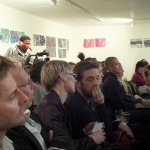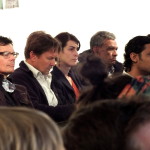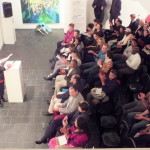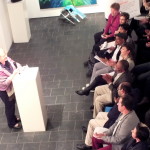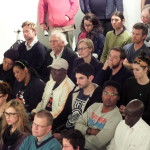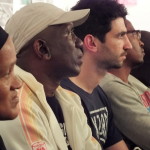R2K hosts the Worldwide Reading for Edward Snowden
Ghalib Galant, R2K Provincial Coordinator for the Western Cape address on the occasion of the worldwide reading for Edward Snowden 8/9/2014, Cape Town
Building a sustainable democracy requires that we are able to address those in society who willfully or even negligently seek to undermine it. Unlawful conduct in state and private bodies endangers the country’s economic stability and eats away at the ethical fabric of society. Indeed, among the gravest threats to our fragile democracy are the actions of unscrupulous businesses, institutions and individuals acting out of self-interest to the detriment of the common good. From cartels colluding to fix prices to government spooks eavesdropping on private individuals; from rigged tenders to jobs-for-pals schemes that entrench patronage as part of the landscape. These unlawful and often corrupt activities impact on us all and, if left unaddressed, allow a culture of impunity to flourish that slowly smothers all hope for an open, transparent, accountable society in which all who live within it are able to participate fully.
It is into this space that the whistleblower steps. Someone who, in good faith, raises a concern about malpractice with an organisation or through an independent structure. Whistleblowing serves as an early warning system; it affords the institution the opportunity to deal with the unlawful or criminal behaviour and so avoid the risks of which I spoke before. Whistleblowing allows an institution to find out that something is going wrong in time to take the necessary corrective action.
And yet, the path of the whistleblower is not an easy one. The fate of the whistleblower is often grim as they are likely to “suffer the slings and arrows of outrageous fortune” as they court vilification and insult from former comrades and colleagues; as they are ostracised from their structures and even families for being disloyal; as they find their careers limited because they spoke out. Others risk incarceration or worse. For all too many it is often fatal.
Edward Snowden was branded a “traitor” by former Vice President Dick Cheney. David Brooks in a piece in the The New York Times, entitled “The Solitary Leaker”, launched a personal attack on him.
“Though obviously terrifically bright, he could not successfully work his way through the institution of high school. Then he failed to navigate his way through community college.”
Not content with defining him as a personal failure, Brooks went on to see him as representing all that is wrong with out society, calling him the “ultimate unmediated man,” without redeeming social commitments: “He betrayed honesty and integrity…. He betrayed his oaths.,,, He betrayed his friends…. He betrayed his employers…. He betrayed the cause of open government.” Not content with that, Brooks climaxes with: “He betrayed the privacy of us all.” And finally, “He betrayed the Constitution.”
Of course today Edward Snowden lives a stateless existence in Russia, in self-imposed exile, having been stripped of this part of his identity as a consequence of his revelations.
Here at home in South Africa we remember Nkululeko Gwala, an activist with Abahlali Base Mjondo who was assassinated after lifting the lid on political corruption in Cato Crest. We remember Moss Phakoe, the ANC Councillor and trade unionist who was killed after revealing fraud in drought relief projects. To add insult to injury, the men convicted of his killing were released recently on appeal. It is almost a year since forensic auditor Lawrence Moepi was killed in a suspected hit as he arrived at his Johannesburg office. He had been working on some big cases involving suspected corruption; he was also part of the Auditor-General’s investigation team on the now-infamous Arms Deal.
We also remember Imraahn Mukaddam, responsible for bringing the collusion among the four largest bread producers to light and revealing how they fixed the price of bread to maximise profits at the expense of the poor and the hungry. We remember the great personal and financial toll that taking that stance exacted on him.
We remember Roberta Nation, here with us today, and her courage in revealing fraud at the State Security Agency. An institution that today still does not seem to have taken remedial action over its operations.
South Africa is among a handful of countries in the world to have enacted specific legislation to offer protection to whistleblowers. However, the Protected Disclosures Act is woefully inadequate since its protections are limited to employees and do not propose adequate remedies that address the risks faced outside the workplace.
Whilst legal reform is currently being considered to extend the protection of whistleblowers, the problem is not – I venture – a legal one. It is a political one.
In an interview, Snowden said “I told the government I’d volunteer for prison as long as it served the right purpose…. I care more about the country that what happens to me. But we can’t allow the law to become a political weapon or agree to scare people away from standing up for their rights, no matter how good the deal. I’m not going to be part of that. ”
And therein lies the rub.
Whistleblowing invariably shines a light on uncomfortable realities and actions, on things some would rather not have aired, or questioned, things best left secret because they are out of step with our Constitutional values of openness, transparency, equality and justice for all. Or they imperil traditional values such as human dignity and ubuntu. Or they reveal just how uncharitable and self-serving individuals and institutions can be. In short, whistleblowing reveals the emperor to be rather shamefully wearing no clothes.
At the ANC’s historic elective conference in Polokwane, the ruling party took a resolution that emphasised that corruption permeates society, undermining its values. It recognised that public action should be encouraged, and that the prevention of corruption fits into party, national and international standards and expectations. It required the party to lead by example in this case. The resolution called for ethical leadership in both the private and public sectors.
Notwithstanding the slow pace of delivery on that resolution by the ruling party, there is much that we can do to push back against an
environment that has become increasingly hostile to whistleblowers. Unfortunately, in South Africa, whistleblowing is still associated in certain quarters with apartheid-era informers, the “impimpi” who revealed the identity and location of political activists seeking to overthrow the illegitimate government of the day.
This is one more vestige of apartheid that we have not eradicated, and should work actively to do so.
Edward Snowden, asks of us all “What does [it] mean for a society, for a democracy when the people you elect on the basis of promises can basically suborn the will of the electorate?”
As the cloak of secrecy is drawn around Nkandla, the Arms Deal, the nuclear deal, the spy tapes and SANRAL, our job is clear….
If we are to realise a society based on democratic values, social justice and fundamental human rights as promised in our Constitution, we need to support the courageous efforts of our whistleblowers and their families so as to give others the courage to continue to speak out.
Solidarity is not enough. We need to campaign to keep cases in the public eye, to remind the powerful that they are being monitored.
We need to continue to advocate for legislative reform that institutionalises protections for whistleblowers.
We need to organise and act in a way that minimises and or even neutralises the threat and the very real risk of speaking truth to power.
And we need to actively build a culture that welcomes openness and eschews secrets, and in doing so honors the courage of whistleblowers.
Speaking in a different time in Ohio, another American, Franklin D Roosevelt said on this day in 1938,
“Let us not be afraid to help each other – let us never forget that government is ourselves and not an alien power over us. The ultimate rulers of our democracy are not a president and senators and congressmen and government officials, but the voters of this country”
Tonight, we salute the courage of whistleblowers everywhere. Forward to a culture of taking responsibility! Phambili!

